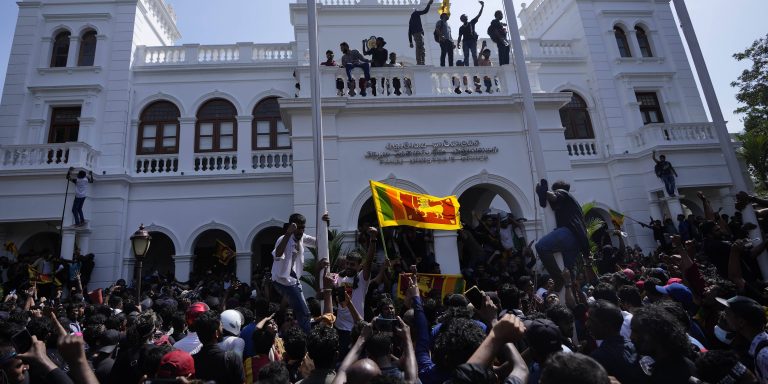INTELBRIEF
July 19, 2022
IntelBrief: Sri Lanka is Experiencing a Growing Political and Economic Crisis

Bottom Line Up Front
- The situation in Sri Lanka continues to worsen with each passing day, as political and economic crises plunge the country into further turmoil.
- Amidst the uncertainty of a political transition, Sri Lanka’s woes have been compounded by countrywide shortages of food, medicine, fuel, and many other necessities.
- Critics have assailed former President Rajapaksa for badly mismanaging Sri Lanka’s economy and accused him and his family of corruption, specifically siphoning money from government accounts to facilitate a luxurious lifestyle.
- Crises like the one currently playing out in Sri Lanka can provide opportunities for regional powers to increase their own influence, a particularly important point to consider in an era of great power competition.
The situation in Sri Lanka continues to worsen with each passing day, as political and economic crises plunge the country into further turmoil. A week ago, in Sri Lanka’s capital Colombo, protesters stormed the Presidential Palace, the official residence of the country’s President, Gotabaya Rajapaksa, demanding his resignation. Scenes depicted protesters wandering through the residence, marveling at the accommodations of a politician living in stark contrast to most Sri Lankans, who are currently struggling to meet daily needs as a result of the country’s worst economic crisis in 70 years. As protesters occupied his home, now former President Rajapaksa boarded a military plane and fled to Maldives before proceeding to Singapore, where he apparently resigned, naming Prime Minister Ranil Wickremesinghe as acting president. Singapore is unlikely to host him for the long term, not only given the potential for international backlash but also due to tensions with many Tamil-origin Singaporeans, who are unlikely to welcome his stay in the country. In Sri Lanka, there were widespread reports of celebrations upon the news of Rajapaksa’s resignation. Lawmakers may hold a vote as early as this week to elect an interim president.
Amidst the uncertainty of a political transition, Sri Lanka’s political woes have been compounded by – and driven by – countrywide shortages of food, medicine, fuel, and many other necessities. Power shortages in this South Asian nation of 22 million people are increasingly frequent, and challenges have been magnified by continued government ineptitude. Protesters began leaving some of the government buildings they had previously occupied; individuals were warned not to vandalize property, and many obeyed this call; however, acting President Wickremesinghe’s private home was badly damaged when protesters set fire to it. The protest movement’s leaders are keen to protect the reputation of the movement as a peaceful one and do not want to sully the image of the citizen-led political opposition. Some of the protests over the last several months, however, had turned violent. Wickremesinghe, the Acting President, declared a state of emergency that granted him broad authorities to deal with the protests, although Sri Lankans are also demanding his resignation. The Public Security Ordinance grants the President power to authorize detentions, take possession of property, or change or suspend laws. The current uncertainty in Sri Lanka has many fearful that a potentially draconian response to ongoing protests, led by the military, may soon be implemented.
Critics have assailed former President Rajapaksa and the political leadership for badly mismanaging Sri Lanka’s economy, investing in the military and costly vanity projects while also granting massive tax cuts. Despite warnings, he forged ahead, and the country’s revenue dried up, its currency collapsed, and inflation skyrocketed. At the same time, as Sri Lankan politicians have noted, government resources were also stretched by the need to manage the Covid-19 pandemic and acquire vaccines and medical support. Conditions in Sri Lanka were made worse by the war in Ukraine. Prior to the outbreak of hostilities there, Ukraine was the third largest importer of Sri Lankan tea, and Sri Lanka relied heavily on Ukrainian and Russian grain imports.
Sri Lanka is now desperate for help and is negotiating with the International Monetary Fund and individual states for debt relief. There are growing concerns over a period of prolonged political and social unrest. These are especially daunting prospects for a nation that experienced a nearly three-decade-long civil war, which featured frequent terrorist attacks conducted by the Liberation Tigers of Tamil Eelam (LTTE), an ethno-nationalist insurgent group that fought for an independent Tamil homeland in the country’s north. Sri Lanka also suffered from devastating suicide bombing attacks on Easter Sunday in 2019. These coordinated attacks were conducted by an extremist group with links to Islamic State, known as National Thoweeth Jama’ath. While there have been no high-profile terrorist attacks since the Easter Sunday massacre, the nation remains on edge about the prospect of violence.
Crises like the one currently playing out in Sri Lanka can provide opportunities for regional powers to increase their own interests. Desperate for economic relief and political stability, Sri Lanka now finds itself vulnerable to predatory influence campaigns. China has financed several large-scale infrastructure projects in Sri Lanka as part of its Belt and Road Initiative (BRI) and there are concerns over Beijing’s long-term approach. Sri Lankans are well aware of these dangers and diaspora communities are watching the extant crisis with particular concern. For example, in the U.S., Sri Lankan community leaders have called for the interim government to avoid further indebting itself to China and hold national elections within six months. Debt traps commonly attributed to the BRI have exacerbated already tenuous economic situations in countries including Sri Lanka, Laos, and Zambia. While Sri Lanka’s human rights record has given some international actors pause in terms of security cooperation, there will be other states which do not have such reservations. In an era of great power competition, every region of the globe is a contest for influence, with the United States, Russia, China, India, and others vying for leverage, access to critical resources, and strategic benefits garnered from relationships with strategically important geography.